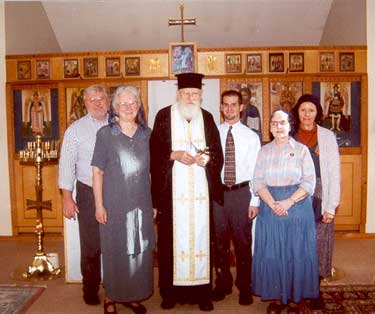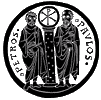Sermon
by Father John Bockman, Delivered on October 15, 2000
Saint John the Confessor Parish, Ipswich, Massachusetts
Luke 6:31-36

Father John and Presbytera Valerie with a few of the parishioners at Saint John the Confessor Parish in Ipswich on October 15. Left to right: Constantine Rasmussen, Presbytera Valerie, Father John, George Masterjohn, Diaconissa Mariamne Graham, and Euphemia Briere
We are in the last months of the twentieth century, distinguished for its violence, world wars, genocides, persecutions, anti-Christianity, government-sanctioned hatred of person against person, class against class. Let us turn our attention to some important words of our Lord Jesus Christ which touch upon such matters. He says:
"Blessed are ye, when, for My sake, men shall hate you, and when they shall separate you from their company, and shall reproach you, and cast out your name as evil." Note the qualification: for His sake.
"[But] I say unto you which hear, Love your enemies, do good to them which hate you (6:27). Bless them that curse you, and pray for them which despitefully use you for My sake" (6:28). Finally there follows the evangelical counsel which has been called "the Golden Rule": "As ye would that men should do to you, do ye also to them likewise" (6:31).
While this statement is a universal principle, it seems clear from the context that it applies particularly to attitudes and behavior toward those who hate us, reproach us, cast out our name as evil, curse us, and despitefully use us for Christ's sake.
For the Lord adds at once, if ye love those that love you, and do good to those who do good to you, and lend to those from whom ye expect to be repaid, ye shall not have earned anyone's gratitude, nor have you really followed "the Golden Rule." To follow it, you must demonstrate sincere love for your enemies, you must do good to them, and lend to them, expecting nothing in return (6:35). If you do these things, you will be called "children of the Highest," that is, of our Father in heaven, Who is kind to the unthankful and the evil, who lets the sun shine and the rain fall upon those who hate Him. And your reward will be great.
In each instance, the standard of judgment in these matters is the same, namely, one's own self. I must love my neighbor as I love myself, and you must love your neighbor as you love yourself. I must do to others as I would have them do to me, and you must do to others as you would have them do to you. But this criterion is but a part of the one great commandment. Indeed, it is expressed as its concluding statement: "Thou shalt love the Lord thy God with all thy heart, and with all thy soul, and with all thy mind; and thy neighbor as thyself" (Luke 10:27). We see that all parts of this commandment form one unified whole — love of God and of all men, without exception, in God, to the same degree as we each individually love ourselves.
Our Lord God and Savior Jesus Christ concludes this counsel as follows: "Be ye merciful as your Father also is merciful" (Luke 6:36). And in the Gospel according to Saint Matthew: "Be ye perfect as your Father in heaven is perfect" (5:48).
What we have been considering here this morning are principles of sacrificial, co-suffering love for others, whereby we may become children of the most high God Who is kind to the unthankful and the evil. Sacrificial, co-suffering love for others is the only way the life of God can be manifested through men in a world which neither knows nor loves God, nor cares about Him.
The grace of sacrificial co-suffering love alone enables you and me to become merciful toward our fellow men as the heavenly Father is merciful, to become perfect as our heavenly Father is perfect.
In summary, we love to a sacrificial degree when we sincerely love our enemies and do good to them that hate us, when we bless them that curse us, and when we pray for them that abuse us for Christ's sake. When we offer the other cheek to those who smite us. When we do not resist theft of our cloak and tunic, though it leave us with nothing for protection. When we give to everyone who asks of us, and when we do not beg the return of that which has been taken away from us. When we lend without expectation of return.
But can anyone today really practice such sacrificial love for others which is expressed in such specific counsels in this gospel? Can this counsel really be observed today? Let us consider further.
On another occasion, in the Gospel according to Saint Matthew, a young man came to the Savior and said, "Good Master, what good thing shall I do, that I might have eternal life?" When he assured the Savior that he had kept the commandments from youth up, the Savior said to him: "If thou wilt be perfect, go and sell that thou hast and give to the poor, and thou shalt have treasure in heaven . . . ." This the young man could not do, and he departed.
The disciple observed and heard this exchange, and when the Savior remarked that it is easier for a camel to go through the eye of a needle than for a rich man to enter into the kingdom of God, the disciples were exceedingly amazed, and said, "Who then can be saved ?"
The Savior's response to this is very instructive. He began His response by saying, "With men this is impossible." It is impossible for men to go and sell all that they have, impossible to give all to the poor and follow Christ. By the same token, it is impossible for men to love their enemies and do good to those that hate them. It is impossible to bless those that curse them, impossible to pray for those that abuse them, to turn the other cheek, to give without expectation of return. It is impossible for men to follow these evangelical counsels and achieve perfection.
But that is not the end of it. The Savior caps His response and instruction by adding, "But with God all things are possible" (Matt. 19:27) With God it is possible to go sell all.that you have and give to the poor. With God it is possible to love your enemies and do good to those who hate you.
What remains, therefore, is to believe what Christ means when He says "with God," and how one cooperates with God in such a way that God can work through man to accomplish these things that are "impossible" with men.
One time the people asked our Lord, "What shall we do that we might work the works of God?" (John 6:28) This gave our Lord the opportunity to declare: "This is the work of God, namely that ye believe on Him Whom He hath sent" (John 6:29). Then he immediately continues clarifying the "sign" they ask for that they might believe, identifying it with the work that He has come to do.
That "sign" is Christ Himself as the bread of God, the bread of life. "As the living Father hath sent Me," He says (John 6:57), "and I live by the father, so he that eateth Me, even he shall live by Me."
Thus we may conclude that receiving the Body and Blood of Christ worthily establishes our life in Christ, and by living in Christ in obedience to His word, can be accomplished in us those things which are impossible for men alone. Let us therefore continue to eat worthily of Christ and drink worthily of His cup, so that we can do the work of God, which is to believe absolutely in Him and the fullness of His word, loving our enemies and doing good to those who hate us.
In the name of the Father and of the Son and of the Holy Spirit. Amen.
The Holy Fathers Speak
On Pentecost and the Gifts of the Holy Spirit
. . . Oh, my brethren, how the Holy Spirit rejoices with inexpressible joy when He finds pure souls that are open to Him and yearn for Him! With a cry of joy, He makes His abode in them and gives them His rich gifts. He enters into them like fire, to turn up the last remaining germ of sin; as light, to illumine them with the heavenly light that never sets; as heat, to warm them with the divine warmth of love, by which the hosts of angels in God's Kingdom are warmed. Saint Symeon the New Theologian says: "As a lamp although it is full of oil and has a wick, remains dark unless it is lit with fire, so the soul is quenched and dark until it is touched by the light and grace of the Holy Spirit" (Mystic Treatises 59).
The Holy Spirit gave the apostles the gift of tongues as His first gift, this being the most necessary to them at that time. But later, again in response to the needs of the apostles' ministry, He poured other gifts into them: the gift of wonderworking, the gift of prophecy, the gift of wisdom, the gift of eloquence, the gift of endurance, the gift of inner peace, the gift of certainty in faith and hope, the gift of love for God and man..
The Holy Spirit distributed these gifts abundantly and joyfully, not only to the apostles, but also to their successors and all the saints in Christ's Church to the present day, all according to need and men's purity. Through His works on earth, the Lord Jesus brought great joy to both the Father and the Holy Spirit. Since Adam's first days in Paradise, the Holy Spirit had not known this joy that was His on the Day of Pentecost, when God the Son created the possibility for Him to be active among men in the fullness of His power. He was, it is true, unceasingly active in the human face, that was enchained by sin from Adam's fall to Christ's Resurrection. But His activity was then confined and hindered by men's sins. He then trod a narrow path among men, pouring sufficient oil into the lamp of life for it not to go out completely.
He also worked through natural laws, and the laws of men, through prophets and kings, through artists and sages — insofar as they could, and were willing to give themselves over to His action. Whenever there fell tears of yearning for God's righteousness into the dust of the earth, this was from the warmth with which he warmed men's hearts. Whenever a wise men had a flash of insight about the one, immortal God, this was His spark in a man's soul. . . .The tales of the poets tell us that of old the hydra when its heads were cut off gained by its injuries, and sprang up more abundantly. . . Thus also heresies in the churches bear some likeness to that hydra invented by the poet, for they too hiss against us with deadly tongues, and they too cast forth their deadly poison, and spring up again when their heads are cut off. . . The remedy should be the more speedy as the sickness is the more dangerous. . . For these shoots of an unnatural seed are no new thing in the churches. The harvest of the Lord's field has always had to put up with burrs and briars, and in it the shoots of choking tares have constantly spring up.
Nikolai Velimirovic, Bishop of Ochrid
